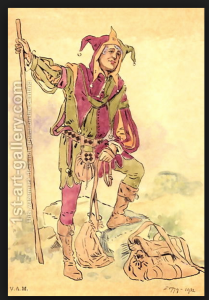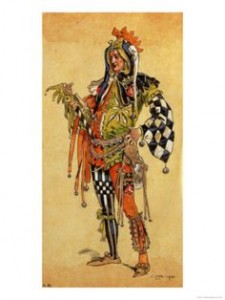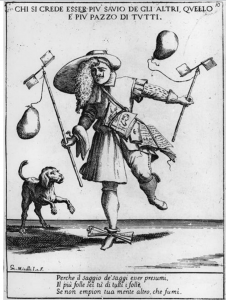“Motley” arises in As You Like It precisely eight times, half of which appear within twenty-two lines of each other, and the majority of which are spoken in the same act, the same scene, and by the same character. To no surprise, this character so seemingly infatuated with “motley” is none other than Jacques.
In 2.7, Jacques exclaims, “…O that I were a fool! / I am ambitious for a motley coat” (2.7.42-43). On one hand, “motley” simply describes the typical attire of a fool, or jester. The Oxford English Dictionary explains this; the first definition given of “motley” is as follows: “Cloth woven from threads of two or more colours” (OED – See Definition A1a). Jacques describes his desire for this type of coat; “The particoloured costume of a jester, harlequin, etc.” (OED – See Definition A3a) because he wants to play the role of the court jester, or fool, under Duke Senior. The picture below demonstrates the mental image of such an outfit:
Yet this is only the straightforward understanding of his use of “motley,” and if we know anything about Shakespeare it’s that he was anything but straightforward. The Oxford English Dictionary enlightens us with another definition of “motley”: “An incongruous, multifarious, or confused mixture or assembly” (OED – See Definition A4). Here, we can compare this twentieth century depiction of a motley jester (above) to one of the nineteenth century (below).
The second picture invokes a much clearer image of this “incongruous” outfit. The colors clash, the sleeves don’t match, and there’s different ornaments hanging from his legs and waist. In comparison to the previous picture which is more symmetrical and orderly, this image demonstrates that Shakespeare meant more than just a type of cloth or outfit when Jacques declares “I am ambitious for a motley coat” (2.7.43).
Jacques’ irony is twofold in this scene. He wants very much to be a fool. However, he wants to be a fool because he wants to be wise, as he sees that only fools have the ability to reflect and the freedom to speak. Jacques recognizes that the fool transcends the boundary between the common people and the gentlemen of the court. Free to speak to both socially classes openly about the other, Jacques sees that the fool embodies this incongruous, or “motley” costume in his nature.
The above image perhaps best depicts the ragtag outfit of a fool or jester. Even the fool’s features are disparate — one half of his face has a pointy mustache while one half of his head has a long wig. While the “motley” costume is comical and thus goes naturally with the fool’s role, the costume also depicts two different ideas into one whole. Similarly, the fool brings two different classes — the court and the common people — together through its comical role in society. Shakespeare thus highlights the importance of the fool and his role in society as someone who can transcend these class boundaries.
While this is only one instance of Jacques’ use of “motley,” he brings it up multiple times in 2.7, such as “A worthy fool! Motley’s the only wear” (2.7.34) and later in the play when addressing Touchstone (3.3.72). Again, his use of “motley” is twofold in most cases. On one hand, Jacques is describing either a fool himself or his clothing, and on the other hand Shakespeare is commenting on the “incongruous” nature of the fool’s role in society. These ideas can be explored further with other instances of “motley” throughout the play.



